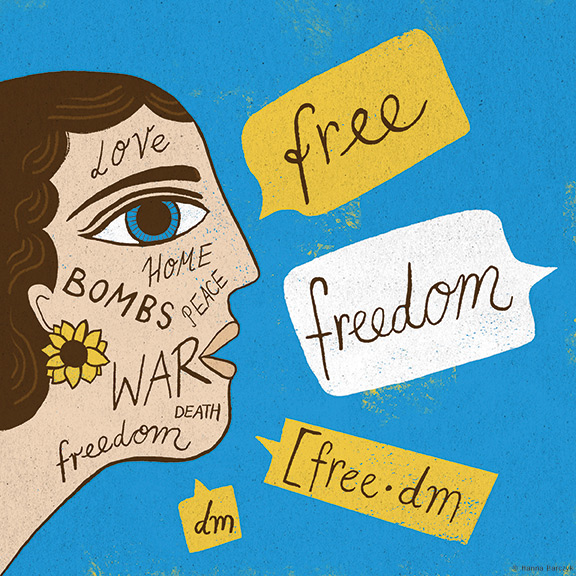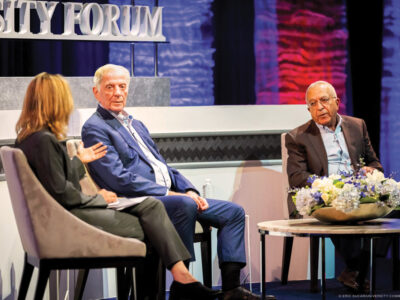
This Ukraine native’s cultural exchange program has taken on new meaning since the outbreak of war.
“We say in Ukraine that everyone has their own front. The soldiers are fighting on the physical front, but everyone has their own front. And this is ours. This is what my team and I can do to help our country.”
So says Katerina Semida Manoff C’09 W’09, the founder of ENGin (pronounced “engine”), a fledgling nonprofit that connects Ukrainians hoping to improve their spoken English with American volunteers via Zoom video call—entirely for free. Manoff launched the organization in 2020 while working with Ukraine Global Scholars, which helps Ukrainian high school students apply to colleges in the US, but its mission has taken on new urgency since Russia invaded earlier this year [“Thinking About Ukraine,” May|Jun 2022].
“The war for us has really just meant growth and expansion, because suddenly we had this huge, huge demand from adult students that we’d never had before, because half the country has lost their jobs,” she says. “There’s a lot of people that are interested in hiring Ukrainians now, but the jobs generally require English. So we have a lot of people who come to us and say, ‘I lost my job, I need to be able to speak English.’”
Providing a sense of current living conditions in Ukraine to sympathetic listeners has been another motivation. “I had so many students who were begging me to connect them to reporters because they wanted to tell their stories, and English is what’s allowed them to do that,” she says. “There’s only so much a bunch of kids or young professionals who speak English can do. But we had a lot of our students make videos, make presentations—all in English, of course—and try to spread their stories as far as they could.”
Those stories include listening for air raid sirens and calls to evacuate to bomb shelters, dreading the possibility of a Russian advance, and other perils of living in a war zone. For Manoff and her students, language is power—and in facing down Russian aggression while battling for international support, the power to share Ukraine’s story is more crucial than ever. “What’s important to understand about Ukraine, I think, is that the desire for freedom in our country is very, very strong,” she says. “I think Americans can relate to that, because freedom is a fundamental founding value of our country as well.”
Getting that story across, though, requires “personal, human connections,” not just bleak headlines. “With any depressing news story,” Manoff says, “people want to forget and move on. But if you know someone in Ukraine, you have a personal relationship with them … that makes a difference in this country supporting Ukraine in tangible ways. To have a friend in Ukraine means you care, and I think on my small scale, I’m really helping with that.”
Manoff notes that many Ukrainian students study English in school, which provides them with a “grammatical basis.” But achieving real proficiency takes more than that. “When you’re on with an ENGin volunteer,” she says, “you have to speak English. There’s no other option. And that’s what our students really need.”
Manoff hopes to make ENGin accessible to all parts of Ukraine, and to scale the organization to 100,000 students or more. ENGin has already served more than 8,000 people, but as it grows, keeping the program free should be a “core tenet of our work,” Manoff says. “Especially now, during the war, it’s unthinkable to ask struggling Ukrainians to pay for the program.” That presents a challenge for an organization that relies on donations and grants. Manoff received startup funding from an anonymous private donor to cover the first year of operations. “What might seem very affordable to us—like, $20 an hour—that’s totally out of reach for most Ukrainian kids,” she says. And access to private tutoring varies considerably with geography. “If you’re thinking about people in Kyiv, they might be able to go and find low-cost or free courses somewhere.” But “if someone’s in a small town or village, they’re not going to have any opportunity like that. So, it was very important to create something that was online, so that anyone anywhere—as long as they had an internet connection—could access it.”
Helping Ukrainians master another language is especially meaningful for Manoff, who hails from Kyiv but at eight emigrated to the US, where she was raised in Connecticut (and lives today). Manoff speaks both Ukrainian and Russian, as a result of having family in both the western, Ukrainian-speaking region of the country, and the eastern, largely Russian-speaking Kharkiv region. Her interest in cross-cultural communication continued at Penn, where she studied business and foreign language through the Huntsman Program for International Studies and Business. “I think I ended up at Penn because I was really impatient to get some hands-on learning, and I was interested in studying business and understanding the business perspective—and Huntsman would allow me to do that without sacrificing the liberal arts.”
Manoff points to Huntsman’s study-abroad requirement as one of many key experiences that would eventually lead to ENGin. “Studying abroad really showed me that how you become fluent in a language is by speaking that language,” she says. “It was only when I went abroad and stayed a few months in Madrid that I became fluent in Spanish, which I had been studying since the sixth grade.”
Manoff graduated with a hankering to run a nonprofit—“a goal of mine since I was little,” she says—but took a winding journey to get there, working in investment banking and freelance writing before attending the Harvard Graduate School of Education (and becoming a parent and starting a family). Launching ENGin has been both rewarding and challenging.
“Carving out your own path—a path that fits exactly your skills and your values and allows you to have a real tangible impact on the world—it’s hard, but it’s also amazing,” she says. “And it will always be worth it to me.”
—Daphne Glatter C’25





ENGin is great. I’m a volunteer with them as well (four months). Talking with my Ukrainian friend has really helped me learn more about her culture. She’s improved her English conversation skills. So we’ve both helped each other! I highly recommend it.